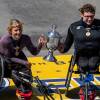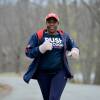In 1966, the year the first woman ran the Boston Marathon, the longest officially sanctioned amateur race for women was 1.5 miles. Running shoes for women did not yet exist, and American society considered it improper for women to run in public.
None of this stopped Bobbi Gibb from hiding by the starting line and joining the crowds of men running, becoming the first woman to complete the Boston Marathon. She completed the race in three hours, 21 minutes and 40 seconds.
“I knew I was doing something I wasn't supposed to do,” Gibb said on Boston Public Radio Monday, while the 126th Boston Marathon — and the 50th official race for women — took place. Before the 1966 race, Gibb had sent an application to Director Will Cloney, who rejected Gibb based on the belief that women could not physiologically run marathons, and that her running could be a medical liability.
In spite of society’s restrictions, Gibb loved to run. “When I ran, especially in nature, in the woods, I felt that sort of miracle of life around me, and I felt free, I was away from society's constraints,” she said.
But before she could race the Boston Marathon, Gibb needed a ride to the start line. “My parents thought I was nuts, they thought I had really lost my grip on reality,” she said. “My dad was very upset, he thought I would hurt myself or possibly die if I tried such a thing.”
Gibb said she clashed with her mother, who also faced limited opportunities. “She felt, ‘for your own good, I really have to get you shaped up and you've got to become a conventional woman,’” Gibb said. “And I wouldn't do it.”
The day of the marathon, Gibb finally changed her mother’s mind. “I said, ‘Mom, you've got to drive me,’ and I could see her lips started to quiver and tears in her eyes, and she said, ‘Okay, get the keys,’” Gibb recalled. “She said, ‘it's something I should have done a long time ago.’”
Gibb ran the race in a hooded sweatshirt, her brother’s bermuda shorts, a bathing suit tank top and boys’ running shoes. “I felt elated in my head, in spirit, but my feet were killing me,” she said, recalling the terrible blisters she endured.
“I knew I had to finish or I'd set women back 50 years, because I had a lot of responsibility on my shoulders,” Gibb said.
The men running alongside her, Gibb recalled, were glad to have a woman in the race. “I wanted to show that men and women can be friends, that we can do everything together, that we don't have to have these stereotypical kind of categories that we fit ourselves into,” she said.
For Gibb, the pivotal moment in the race came when she ran by Wellesley College, often called the “scream tunnel.” She remembered passing a woman spectating the race with her children.
“Our eyes met and there was this connection, and it was at that moment I knew that this was a pivotal event, that we could never go back… that this was really going to change people the way people think about women,” she said.









